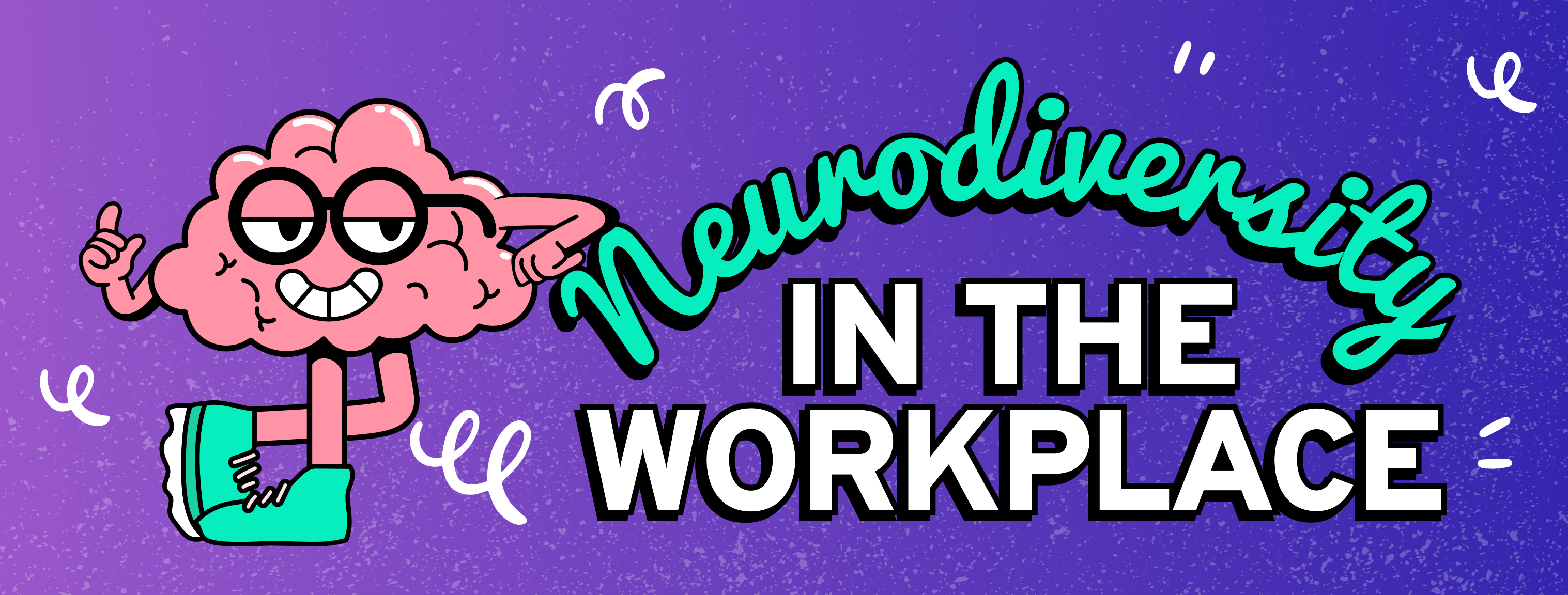Neurodiversity In The Workplace
11th Jul 2022

As an increasing number of companies are embracing diversity, equity, inclusion and belonging (DEIB), there has been an increased investment in supporting marginalised employees. However, neurodivergent individuals are frequently left out of the conversation.
What is neurodiversity?
Neurodiversity refers to the different ways the brain can work and interpret information. In essence, neurodiversity recognises the different ways that people learn, behave, think about and process information, which is often different to the way that society expects. It is estimated that 1 in 7 people in the UK (about 15% of the population) are neurodivergent and many remain undiagnosed. Neurodivergent individuals include those with autism, ADHD, dyslexia, dyspraxia, social anxiety disorders and more.
Employers frequently misunderstand neurodiversity and see it as a challenge, thereby making it difficult for neurodivergent people to build, sustain and progress through their careers. For example, only 21.7% of people with autism in the UK are employed, which is a reflection of how difficult traditional workplaces can be for neurodiverse team members. This is a huge loss for employers, given that neurodivergent employees are creative problem solvers, logical thinkers, and groundbreaking innovators.
Neurodiversity and neurodivergence - what do they mean?
The term “neurodiverse” can be used to describe a group of people who are neurodivergent. Neurodiversity appreciates the variation of cognitive functioning in people, recognising that everyone has a unique brain, meaning they have unique abilities, skills and needs.
Neurodivergence recognises any cognitive functioning which we would not consider to be “typical,” and includes people with autism, ADHD, dyslexia and more.
Raise awareness and promote neurodiversity in the workplace
For neurodivergent people to feel safe and valued at work, it's important for companies to champion neurodiversity. To do this, companies can showcase and be proud of neurodiverse employees, implement mandatory training for all employees, engage with employees with lived experience to help others understand and value neurodiversity, and prioritise neurodiversity as a core part of the company's DEI strategy and values.

4 ways to build and support a neurodiverse workplace
1. Accommodate, accommodate, accommodate
It's not enough to simply hire neurodivergent team members – you have to create an environment where they can thrive. It's important that managers ask and communicate with neurodivergent employees about what accommodations they need in order to do their job well. For example, employees with autism might be sensitive to sound and may need a reasonable adjustment like noise-cancelling headphones, or a team member with ADHD might work better during non-traditional hours, and could benefit from flexible hours to be their most productive. That’s why what we do here at Flexa is so crucial, because flexibility at work can open up the doors for so many more neurodivergent people to get the accommodations and support they need, and have the tools and resources to succeed.
Remember that neurodivergent people are unique – it's important to communicate, listen and implement any workplace adaptations.
Here, Shannen Pollard, Flexa’s Social Media Manager talks about what it was like to share her ADHD diagnosis with the team:
“Sharing my ADHD diagnosis with my managers was one of the most terrifying things I’ve ever done. I had only recently started my job at Flexa when I received my formal diagnosis: ADHD-C (combined type). When I did finally share my diagnosis, it felt like a weight had been lifted and I remember breathing a huge sigh of relief before breaking into nervous laughter, as Molly and Maurice put me at ease and reassured me that it was all good. After that, both went the extra mile to check in with me regularly; make sure I was okay and ask whether I needed anything - including tools and resources to help me remain happy, comfortable and productive.
I can’t explain how important transparency and communication has been to my journey. If you’re neurodivergent and working in a company where you feel like you can’t be yourself or honest about your experiences, and switching jobs is an option, it might be time to reevaluate your options. There are plenty of companies out there, who understand the importance of their people and the benefits of having a neurodiverse workforce.”
2. Make inclusive hiring a priority
The working environment is one of the most crucial considerations for a neurodivergent individual when looking for a new role. Be transparent about your company’s ways of working - from hours and location through to benefits - so that individuals can make an educated decision about whether your working environment will allow them to thrive. You can do this on your own careers pages, job descriptions, or, in order to gain larger reach and awareness, consider a platform such as Flexa.
In addition,to attract and retain neurodiverse employees, it's important for hiring managers to let go of the archaic idea of what makes a "good candidate." During interviews, neurodivergent candidates may struggle to make eye contact and or appear fidgety and distracted. While it's important to ask candidates about reasonable adjustments, taking critical steps to adjust your recruitment process, such as providing interview questions ahead of time, may also be particularly beneficial for neurodivergent individuals.
3. Adjust how you communicate
When working with neurodiverse team members, it's important to adjust how we communicate. For example, to communicate with individuals with autism, it can be helpful to use simple messages, avoiding sarcasm, or even provide tasks in a written format. Many people with autism or ADHD might also struggle with changing schedules, so it can be useful to communicate any changes as early as possible. Managers also need to be aware that what we consider traditional "work etiquette" might not always be immediately obvious to neurodivergent team members – and it's important not to punish that behaviour.
4. Listen – and engage
The most powerful way to promote neurodiversity at work is to listen and engage with neurodivergent team members and employees. Establishing an Employee Resource Group (ERG) as well as connecting with the local community can make a world of difference for companies looking to make a lasting impact and shift the organisational culture.